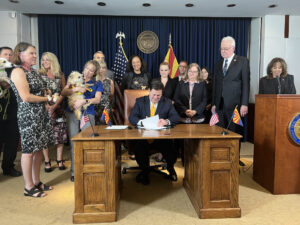2022 Legislative Victories
Six Animal Protection Bills Passed by Legislature
The 2022 session of the Arizona Legislature was one of the longest sessions in state history. Six bills that will help protect animals were passed and signed into law. Three of the measures were sponsored by Representative John Kavanagh, a long-time advocate for animals. His efforts include legislation that prohibits insurance companies from raising rates or denying people homeowners’ insurance based solely on the breed of dog they keep. Another bill adds a criminal penalty for bringing a minor to a cockfight or animal fight. And he also sponsored a measure that requires scanning dogs and cats for a microchip and making a reasonable attempt to contact their owners.
homeowners’ insurance based solely on the breed of dog they keep. Another bill adds a criminal penalty for bringing a minor to a cockfight or animal fight. And he also sponsored a measure that requires scanning dogs and cats for a microchip and making a reasonable attempt to contact their owners.
Representative Amish Shah and Senator J.D. Mesnard sponsored the new law that allows municipalities in Maricopa and Pima Counties to prohibit the overnight use of consumer fireworks except for two hours permitted on July 4 and December 31. Rep. Shah, an emergency medicine physician, has been a tireless champion for animals. This session he again sponsored legislation to prohibit declawing of cats, a painful, unnecessary procedure which can cause significant medical issues. He and Senator Sean Bowie also reintroduced separate bills aimed at stopping pet stores from selling dogs from puppy mills. While those bills failed to pass, we have no doubt Rep. Shah will not give up on these important measures. Sen. Bowie is not seeking reelection but we thank him for his efforts.
A new law sponsored by Rep. T.J. Shope establishes the Arizona Veterinary Loan Assistance Program to address Arizona’s veterinary shortage by providing incentives to keep veterinarians working within the state.
Another new law, sponsored by Representative Shawnna Bolick, prohibits anyone on probation for an animal cruelty violation and commits a second animal abuse offense from possessing or having contact with any animal as a condition of release.
Thanks to all of the animal advocates who contacted their lawmakers in support of these bills. Your efforts were instrumental in getting animal protection measures passed and signed into law.
Bills Passed and Signed into Law
HB2323 homeowner’s insurance; dogs; nondiscrimination (Kavanagh) bans breed discrimination by insurance companies. Prior to this bill’s passage, insurance companies have been able deny or drop coverage and charge higher premiums based solely on the breed of the family dog. HB2323, sponsored by Rep. John Kavanagh, prohibits insurance companies from hiking rates or denying people homeowners’ insurance based on the type of dog they keep.
denying people homeowners’ insurance based on the type of dog they keep.
At a time of unprecedented housing challenges, the cost and availability of property insurance is often an unnecessary barrier to housing for responsible dog owners across the country. This is because the vast majority of property insurance companies have been able to hike the cost of premiums or deny insurance coverage for customers who have specific breeds of dogs. The range of dog breeds captured by this arbitrary practice includes many common and beloved breeds such as Labrador Retrievers, Boxers, Giant Schnauzers, German Shepherds, Dobermans, Chows, Great Danes, Alaskan Malamutes and more. This causes many thousands of responsible dog owners to be burdened with harsh financial and emotional consequences.
This practice is unjustified and unsupported by data. There is also no evidence to support that insurance claims for the prohibited breeds are financially significant for insurance carriers relative to other paid losses. Homebuyers are required to obtain property insurance coverage as a prerequisite to obtaining a mortgage. Yet many insurance companies refuse to provide coverage for dog owners of certain breeds, which puts customers in the position of having to choose between owning a home and their family pet. Learn more in this white paper by animal welfare organizations.
Past behavior is a much stronger indicator of current behavior than genetics, so HB2323 specifically reserves insurers’ latitude to cancel, refuse to issue or renew or to increase premiums for households in which a resident dog of any breed has a history of aggression. Thanks to and supported by Best Friends Animal Society for their efforts to get this bill passed.
ADLA supported this measure.
HB2323 passed the Senate 26-1-3, passed the House 43-10-7, and was signed into law by Governor Ducey.
HB2324 animal fighting; cockfighting; minors presence (Kavanagh: Shah) is an emergency measure that classifies, as a class 1 misdemeanor, knowingly causing, allowing or assisting a minor to attend an animal fight or cockfight or any place where fight preparations are being made. Cockfighting and animal fighting are already illegal in Arizona. This bill charges people who bring minors to cockfights or animal fighting contests with an additional penalty.
minors to cockfights or animal fighting contests with an additional penalty.
Many of our supporters volunteered on the grassroots citizen initiative campaign (Prop 201) that banned cockfighting in 1998. Before voters outlawed the blood sport, we worked unsuccessfully to pass bills to ban cockfighting in the Arizona Legislature. Bill and initiative opponents defended cockfighting as a family activity which children frequently attended.
Research indicates that children who are regularly exposed to animal cruelty puts them at risk. When children become accustomed to the pain and suffering they witness, they can become desensitized and it can interfere with their emotional development. HB2324 will help prevent children from being needlessly exposed to the animal cruelty, violence, and other illegal activity at brutal cockfights and animal fighting events. Thanks to HSUS-AZ Director Gabe Wigtil for his efforts to get this bill passed.
ADLA supported this measure.
HB2324 passed the House 59-0-1, passed the Senate 24-2-4, and was signed into law by Governor Ducey.
HB2372 animal cruelty; release conditions (Bolick) prohibits a person serving a term of probation for a cruelty to animals violation and who has committed a new animal cruelty violation from possessing or having contact with any animal as a condition of release. In 2021, the Arizona Legislature passed a law that prevents persons convicted of extreme animal cruelty to own an animal or live in a house with one for a certain period of time. HB2372 applies these restrictions to someone who is currently serving a term of probation for a cruelty to animals offense and has committed a new animal cruelty offense on the person’s own recognizance or on the execution of bail.
ADLA supported this measure.
HB2372 passed the House 59-0-1, passed the Senate 26-0-4, and was signed into law by Governor Ducey.
HB2626 animal handling; microchip scan (Kavanagh: Shah) requires all dogs and cats to be scanned for the presence of a microchip and reasonable effort made to contact the owner upon being impounded at a county pound, city or town facility, a veterinarian or humane society. The bill also requires that all deceased dogs and cats be scanned for a microchip and reasonable effort made  to contact the owner when found in a public place and brought to a county pound, city or town facility, a veterinarian or humane society. Thanks to Debra Nolen for her efforts to get this bill passed.
to contact the owner when found in a public place and brought to a county pound, city or town facility, a veterinarian or humane society. Thanks to Debra Nolen for her efforts to get this bill passed.
ADLA supported this measure.
HB2626 passed the Senate 26-1-3, passed the House 42-15-3, and was signed into law by Governor Ducey.
SB1271 Arizona veterinary loan assistance program (Shope) establishes the Arizona Veterinary Loan Assistance Program to address Arizona’s veterinary shortage by providing incentives to keep veterinarians working within the state. The Program will provide student loan reimbursement, up to $100,000, to veterinarians who graduated from school after January 1, 2023. To qualify for the reimbursement veterinarians must work in Arizona for at least 4 years, and it will be required for two of those years spent at a municipal, county, or nonprofit shelter or in an agricultural practice in a rural area. Thanks to Arizona Humane Society and the Humane Society of Southern Arizona for their efforts to get this bill passed.
ADLA supported this measure.
HB1271 passed the Senate 27-2-1 but was held in the House. However, the bill was included in the Arizona budget and signed into law by Governor Ducey.
HB2226 (Shah: Bowers, Longdon, Pawlik) and SB1275 (Mesnard: Shah) fireworks; use; overnight hours; prohibition, allows cities and towns in Maricopa and Pima Counties to prohibit the overnight use of consumer fireworks except for two hours permitted on July 4 and December 31. While this new law will not end the use of fireworks, it is a significant step, especially considering the challenges of passing legislation to ban consumer fireworks.
overnight use of consumer fireworks except for two hours permitted on July 4 and December 31. While this new law will not end the use of fireworks, it is a significant step, especially considering the challenges of passing legislation to ban consumer fireworks.
Since the Legislature passed a law in 2009 allowing certain types of fireworks to be sold to consumers, neighborhoods across the state sound like a war zone, not only on legal holidays but at other times thanks to easy access to fireworks at pop-up corner stands. The bright lights and booming sounds of fireworks can be extremely difficult for veterans suffering from PTSD, and result in terrified animals injuring themselves, getting killed on roads, or winding up in animal shelters. Fireworks are especially terrifying for homeless shelter dogs, which raises costs for taxpayers, donors, animal rescues and shelters. Fireworks impact already overburdened first responders and can also cause wildfires deadly to wildlife and habitat, especially with our drought conditions.
It is important to note that cities in Arizona’s two largest counties have been powerless to regulate fireworks in their communities. The Legislature passed a law in 2014 that prohibits cities and towns in Maricopa and Pima Counties from regulating the sale or use of fireworks for periods around holidays. And in the 2020 and 2021 sessions, bills were introduced that would have legalized aerial fireworks in Maricopa and Pima Counties, which shoot 100 feet into the air and explode. Fortunately those measures failed to pass.
Representative Amish Shah, an emergency room physician, has sponsored measures to restrict the use of fireworks over the past two sessions, and along with Senator J.D. Mesnard, was successful in getting the fireworks restriction bill passed and signed into law.
ADLA supported this measure.
SB1275 passed the Senate 23-6-1, passed the House 36-21-3, and was signed into law by Governor Ducey.
While not an actual legislative victory, the Cage-Free Egg Rule was passed as a state regulation. Bills sponsored by Rep Kavanagh to provide more humane requirements for egg-laying hens, which failed in the 2020 and 2021 sessions, were passed on a regulatory level by the Arizona Dept. of Agriculture. The new rule (R22-62) requires that eggs produced and sold in Arizona must come from hens free from cage confinement by 2025. Thanks to HSUS-AZ for their efforts on the legislative and administrative levels to pass this regulation.
ADLA supported both bills and the regulation.
There were several animal protection bills that failed to pass the Legislature in the 2022 session, including a measure to ban the inhumane, unnecessary declawing of cats; two bills aimed at pet store sale of puppy mill dogs; and legislation to repeal the special-interest board that controls the appointment of candidates to the Arizona Game & Fish Commission.
ADLA, Humane Voters of Arizona, and other groups will work to pass these bills in upcoming sessions. Special thanks to ADLA’s volunteer lobbyist Don Bentley and Humane Voters of Arizona’s volunteer lobbyist Martha German for their substantial efforts on pro-animal legislation.
Please let us know if you have questions or comments on legislation. Email Karen Michael at kmichael@adlaz.org.

